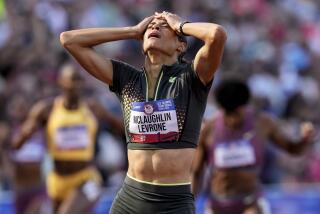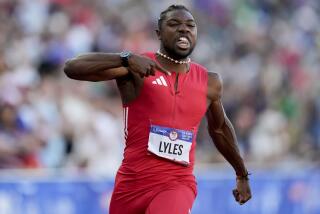Judge to Hear Case of Reynolds Today : Track: The 400-meter record-holder wants to be allowed to compete in the U.S. trials, but it could cost other competitors a shot at the Olympics.
- Share via
Joseph Kinneary, a U.S. district court judge in Columbus, Ohio, is expected to rule today on a question that has put track and field organizations at odds: whether 400-meter world record-holder Butch Reynolds has the right to run in the U.S. Olympic trials, beginning Friday at New Orleans.
Kinneary will hear arguments from attorneys representing Reynolds, the U.S. Olympic Committee, The Athletics Congress--which governs track and field in the United States--and possibly representatives of several athletes who face a ban from the international track federation if Reynolds is allowed to compete.
Whatever happens, Reynolds’ attempt to run in the trials will not lead to a chance for him to run in Barcelona. The International Olympic Committee has already said that he is not eligible because he is under suspension by his federation.
Reynolds, 27, burst upon the world scene in 1988 when he broke Lee Evans’ 20-year-old world record of 43.86 seconds, set at the Mexico City Olympics. Reynolds’ time of 43.29 at Zurich that August immediately set him up as the gold-medal favorite in the Seoul Olympics the next month.
Reynolds settled for the silver medal at Seoul, finishing behind Steve Lewis of the Santa Monica Track Club.
But since 1990, an angry Reynolds has been fighting, not running. He says he has spent more than $100,000 battling a ban imposed after he tested positive for an anabolic steroid, and that he has lost hundreds of thousands of dollars in income and endorsements.
The situation is complicated by conflicting rules that govern international sport. His high-profile case has, at times, pitted TAC against its ruling international federation, set Reynolds at odds against other runners, and has put the USOC in the uncomfortable position of seeking to deny the right of an athlete to compete in the trials--which is against its constitution--or following a judge’s order to allow an ineligible athlete to compete--which is also against the USOC’s constitution.
Reynolds, who is from Columbus, was suspended in November of 1990 by the International Amateur Athletic Federation. He appealed the decision and was supported by the American federation, which agreed with Reynolds that the test was flawed.
But last April in London, an IAAF arbitration panel ruled that Reynolds was ineligible to compete until Aug. 12, 1992, three days after this summer’s Barcelona Olympics.
Reynolds sought redress in domestic courts and has twice used a temporary restraining order to enter meets so that he could have a chance to run the qualifying time necessary to compete in the trials. Reynolds has since qualified.
His fight to run despite the IAAF ban has caused a problem for TAC, which has tried to abide by the rules of its parent federation, the IAAF, and also follow the conflicting mandate of a U.S. district judge.
That’s what could happen today, if the judge once again allows Reynolds to run. Kinneary is the same judge who issued the order on May 28, allowing Reynolds to run domestically.
To prevent that from happening again, TAC will be represented by Duke University law professor James Coleman and the USOC will be represented by its general counsel, Ron Rowan.
TAC supports Reynolds’ claim against the IAAF, that his drug test after a meet Aug. 12, 1990, at Monte Carlo was improperly handled. A TAC panel in April found that the irregularities in the testing of Reynolds’ sample left “too much doubt to find against him.”
At today’s hearing, though, Coleman will ask that Reynolds not be allowed to run in the 400 at the trials, preliminaries of which are scheduled Saturday afternoon. TAC is expected to explain the IAAF eligibility rules to the judge, and also note that Reynolds’ presence in the race is likely to jeopardize the eligibility of the 31 other runners.
The IAAF has renewed its threat to sanction any runner who competes against Reynolds in the trials, citing its “contamination rule.”
It was the same threat that hung over the Bruce Jenner meet last month, prompting promoter Bert Bonanno to withdraw Reynolds’ invitation to run. IAAF General Secretary Istvan Guylai said at the time that every athlete in the Jenner meet would be suspended if Reynolds competed. Guylai said the IAAF had jurisdiction over who runs, “not an Ohio court.”
Bonanno was unwilling to call the IAAF’s bluff, if it was one, and Reynolds did not run.
A similar question hangs over Reynolds’ participation at the trials, although, again, few sports officials are disposed to take responsibility for endangering the eligibility of what potentially could be the entire U.S. Olympic track team.
“We are all concerned about the rights of Reynolds,” a USOC spokesman said Tuesday. “But we also have an obligation to protect the rights of hundreds of others.”
That is what USOC counsel Rowan is expected to argue before the judge, citing Section 5 of the USOC constitution.
Some athletes have discussed the possibility of their own legal actions, should Reynolds be allowed to compete.
They are in a difficult position. If they compete against Reynolds, they face a possible ban from the IAAF. If they don’t run, they forgo their opportunity to make the Olympic team.
More to Read
Go beyond the scoreboard
Get the latest on L.A.'s teams in the daily Sports Report newsletter.
You may occasionally receive promotional content from the Los Angeles Times.








